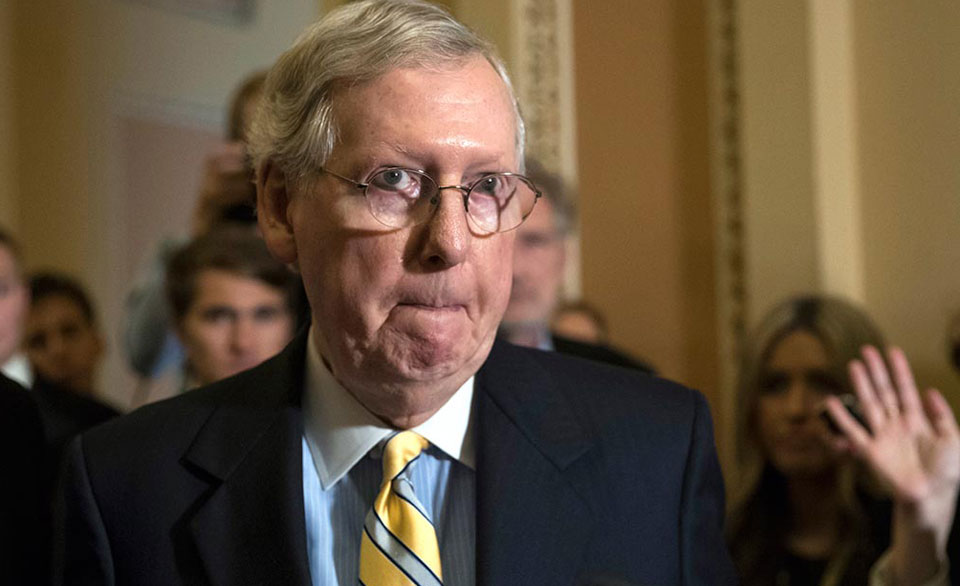
Even as a few Republican leaders slammed Oval Office occupant Donald Trump’s presidential debate endorsement of the white nationalist Proud Boys and similar racists, other patterns in the aftermath of his statement are emerging.
The first is from Trump himself. He tried to excuse his endorsement by telling reporters “I don’t know who the Proud Boys are. You’ll have to give me a definition.” That’s what he said about Ku Klux Klan leader David Duke after Duke endorsed Trump in 2016.
“I don’t know anything about David Duke, OK? I don’t know anything about what you’re even talking about with white supremacy or white supremacists,” Trump said then.
The second is the Proud Boys who, like Duke four years ago, are waving Trump’s backing like a flag. The racist group posted Trump’s comment on its website and on social media and is marketing T-shirts and other paraphernalia emblazoned with his words—along with its weapons and military gear.
The third is a few GOPers, including the only Black GOP U.S. senator, South Carolina’s Tim Scott, and Senate Majority Leader Mitch McConnell of Kentucky, are criticizing Trump, but the rest shut up. And with one probable exception, Utah’s Mitt Romney, none are running away from backing Trump. That happened in 2016, too.
And the fourth is that it may not make much difference to the voters.
Former Sen. Jeff Flake, R-Ariz., who keeps in touch with old colleagues, told the Washington Post they privately fret about whether Trump’s comments will drag them down in the election.
Trump, as usual, set off the uproar in his Sept. 29 nationally televised debate with Democratic nominee Joe Biden. Asked point-blank by moderator Chris Wallace to disavow and denounce such racists and white nationalists, Trump first said “name some.” Biden named the Proud Boys, the heavily armed group that disrupted peaceful Black Lives Matter protests in Portland, Ore.
“Proud Boys, stand back, and stand by!” Trump declared to that extreme white nationalist group. “But I’ll tell you what, somebody’s got to do something about antifa and the left. This is not a right wing problem, this is a left wing problem.” That, like 20,000 other Trump statements, is a lie.
Trump tried to walk it back the next day, saying he didn’t know who the Proud Boys are. But Biden pointed out in the debate that Trump’s own FBI director, Christopher Wray, identifies white nationalists and similar racists as the top political violence threat in the U.S. When Biden cited Wray, Trump said Wray was wrong.
A few GOP senators said Trump is wrong. “He should unequivocally condemn white supremacy,” said Sen. Bill Cassidy, R-La. So did Romney, the party’s 2012 presidential nominee.
“I think he [Trump] misspoke,” said Scott. “I think he should correct it. If he doesn’t correct it, I guess he didn’t misspeak.” McConnell agreed with Scott, then added: “It was unacceptable not to condemn white supremacists, and so I do so in the strongest possible way.”
Sen. Susan Collins, R-Maine, who’s in a tough re-election fight against the progressive pro-worker, pro-choice Democratic House Speaker Sara Gideon, called Trump’s endorsement of the white nationalists “absolutely unacceptable,” but only after faulting both Trump and Biden for the debate’s nasty tone.
Sen. Tom Tillis, R-N.C., who also faces a tough race against Democrat Cal Cunningham, wouldn’t even go that far. “I’ll leave it to the president. I know he’s not a racist. I’m sure he doesn’t approve of their activities,” referring to the Proud Boys, Tillis said, according to the Post.
Tillis’s statement, of course, flies in the face of Trump’s long record of racism. The record stretches all the way back to the start of his developer days, when Trump and his father, Fred, pled no contest to federal charges that they illegally barred Blacks from Trump-built federally subsidized housing in New York City.
And his racist and xenophobic streak ran through his 2015 candidacy announcement, his “s***hole countries” comments, his Muslim ban, his demand that four first-term congresswomen of color—“The Squad”—go back to where they came from, though all are U.S. citizens, and three are natives, and more.
Yet, none of the critics walked away from Trump this time, although Romney did so four years ago. He wrote in the name of his wife, Ann, on the presidential ballot.
That, too, fits a pattern. After Trump’s racist statements in 2016 about a federal judge whose parents were Mexican immigrants, then-House Speaker Paul Ryan, R-Wis., blasted him—but didn’t disavow him. Nor did other Republicans, even those who opposed him in the party’s primaries.
Ryan called that Trump 2016 anti-Mexican slam “the textbook definition of a racist comment.” But he didn’t withdraw his endorsement of Trump.
Democrats, of course, had a field day with Trump’s support of the Proud Boys and other white nationalists. Biden called Trump’s overall debate performance “a national embarrassment,” but also said he wants to debate him twice more, as scheduled.
Others were harsher.
Trump “will play the race card, because he’s a racist,” said Rep. Cedric Richmond, D-La., who represents New Orleans and formerly chaired the Congressional Black Caucus. Rep. Tim Ryan, D-Ohio, who briefly ran for president in the 2020 primaries, said of Trump’s debate performance that “it’s like trying to debate a drunk gorilla that’s just going crazy.”










